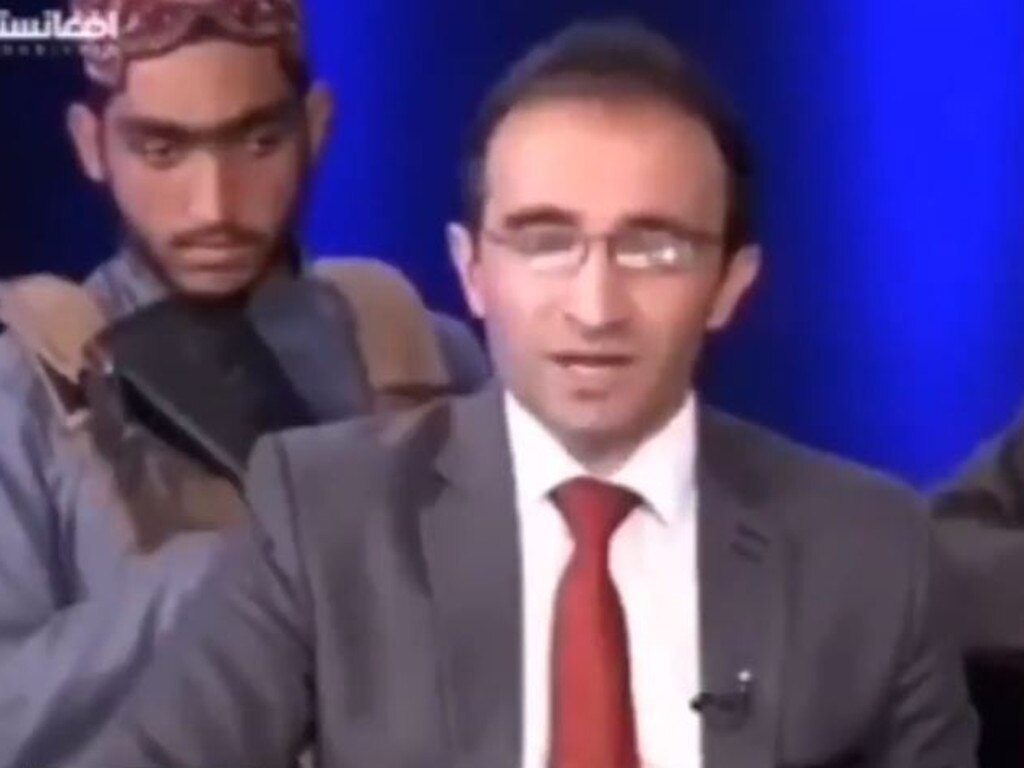Australia v Afghanistan Test: Former coach Peter Anderson fears women will be blamed for match being cancelled
A former Afghanistan coach fears the country’s women will be blamed if the Test match against Australia is cancelled in a further blow after the Taliban takeover.
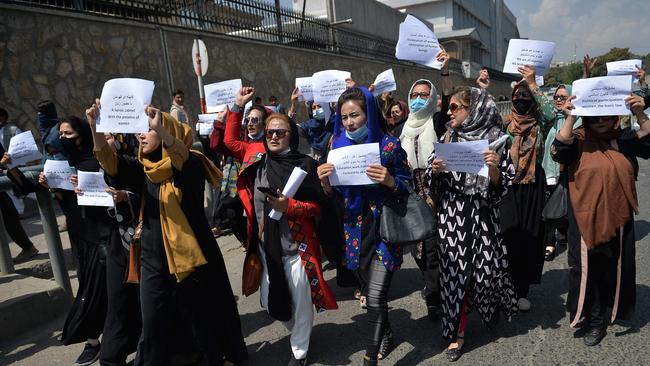
Cricket
Don't miss out on the headlines from Cricket. Followed categories will be added to My News.
The looming cancellation of the Hobart Test will have devastating consequences for the women it was intending to protect, according to an Australian who coached Afghanistan.
Peter Anderson, the former Queensland wicketkeeper who coached Afghanistan to the 2015 World Cup in Australia, is writing to Cricket Australia and the players union urging them not to cancel November’s Hobart Test because of the Taliban’s intention to ban women’s cricket.
“I think it’s a really short sighted and bad decision,’’ Anderson said of Australia’s threat to call off the historic clash after a Taliban spokesman said it was not essential for women to play cricket in Afghanistan.
“I have spoken to the women over there (in Afghanistan) and they are devastated by this decision. It will destroy them. The women will end up copping the blame for this.
Watch India’s Tour of England Live & On-Demand on Kayo. New to Kayo? Try 14-Days Free Now >
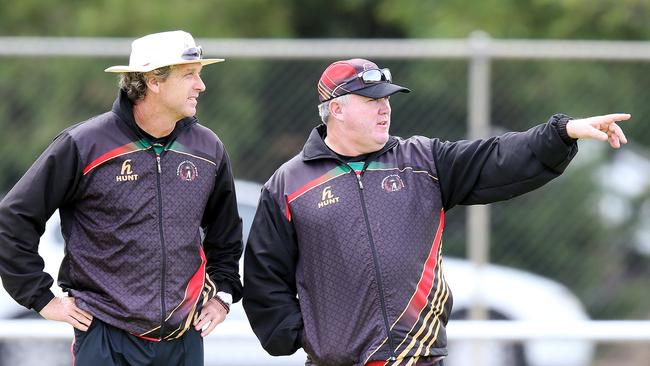
“In a feudal, tribal society that is the way it will work. Sometimes the people you think you are helping are the ones you do most damage to.
“Has anyone from the ICC even been to Afghanistan? I know the Taliban. I’ve been there and I’ve spoken to them. You are talking about a 12th century culture.
“You cannot change things overnight. Do you think this ban will worry the Taliban? Honestly, they won’t give a crap. So who is this decision actually going to help?
“The key is to say to the Taliban ‘look, you are out of order here but let’s keep talking.’ It might have been slow steps in a 10-year process but once the women’s team was up and running and doing well national pride can take over.
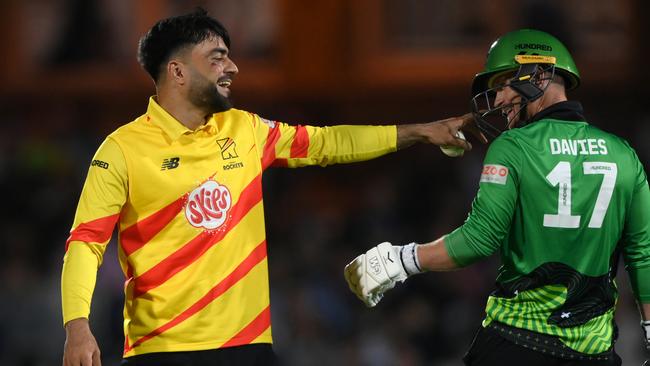
“I am a massive advocate for women’s rights but these things take time. It’s sad but you have to keep going. Cricket has grown so much in Afghanistan. You see it played everywhere.
“What worries me now is that the bridge has been blown up and everything will fall apart and you may never be able to cross that bridge again. It has started already with Rashid Khan resigning as captain overnight.’’
Rashid, a global star and one of the game’s most charismatic players, resigned in protest at not being consulted at the selection of Afghanistan’s latest white ball teams.
“The thing that gets me is when I was there in 2014 the women’s cricket program was shut down and I wrote to Cricket Australia at the ICC and no-one said ‘boo,’’ Anderson said.
“We had $h400,000 for that program and suddenly money went missing. No-one seemed to care.
TALIBAN’S FEMALE SPORTS BAN COULD KILL TEST
Confirmation the Taliban will not allow women to play sport has thrown further doubt on the chance Afghanistan’s November Test against Australia will proceed.
Australian cricket is in discussions with the Australian government and the International Cricket Council as it weighs up the fate of the Test match.
Cricket Australia chief executive Nick Hockley said the situation was complex and the issues “bigger than cricket”, but conceded there was a “real consideration” that cricket would take a unilateral decision over the treatment of female players.
Questions have been raised over the event since the murderous Taliban regime took over Afghanistan last month.
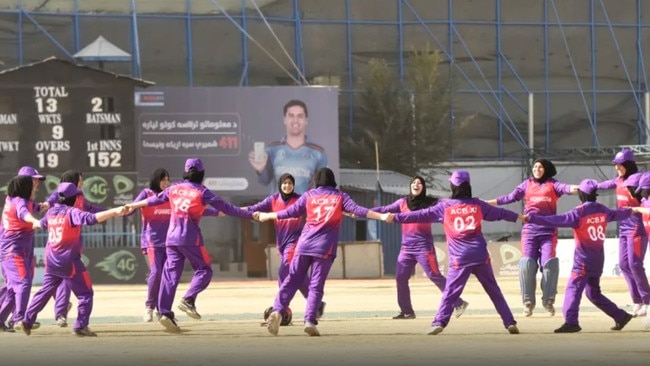
SBS reported on Thursday that the Taliban’s deputy head of culture had ruled out women playing cricket.
“I don’t think women will be allowed to play cricket because it is not necessary that women should play cricket,” Ahmadulla Wasiq told the broadcaster.
“In cricket and other sports, women will not get an Islamic dress code. It is obvious that they will get exposed and will not follow the dress code and Islam does not allow that.”
Female sports stars have received death threats, many have fled the country in fear for their lives and there are concerns for Afghan women cricketers. The males have been assured that cricket has the approval of the fundamentalists.
The Tasmanian government has sought advice from local refugee communities about hosting the fixture.
“It is such a complex and difficult situation,” Hockley said.
“There’s many, many layers to it, many of them which are much bigger than cricket.
“We are working and in regular contact with the ICC and the Australian government and we will take our lead from them.
“As it stands as of today, Afghanistan are a full member of the ICC, they are due to compete in the T20 World Cup and over the coming weeks we will be seeking advice from all the relevant organisations.
“As it currently stands, the Test is due to proceed.”
Hockley said there was more to go through in the discussions about Afghanistan.
Tasmanian Premier Peter Gutwein signalled concerns about the Test match in a budget estimates hearing this week.
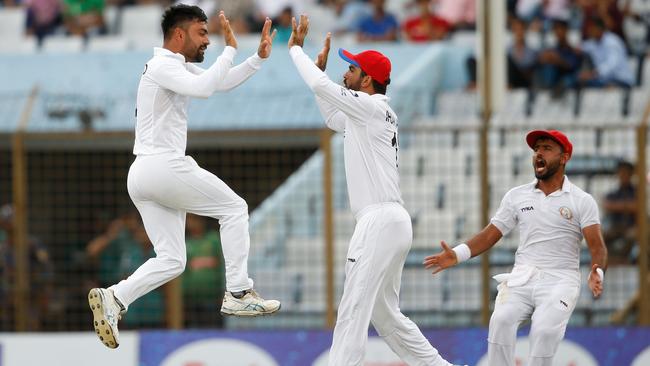
“I have very real concerns as to whether or not the state should hold that match without some very clear commitments being made around it in terms of the future of women’s sport,” the Premier said.
“What I intend to do, in terms of that match going ahead, is reach out to the Hazara community later this week and have a chat with the local communities here to get a sense as to their view.
“We‘ll be seeking to engage with the Australian Cricket Board (Cricket Australia) and I want to get the feedback from our local community as well.
“If our local community felt that it would be sensible and perhaps confidence building to allow that match to go ahead then obviously that’s a different matter. But I think we need to get some advice.”
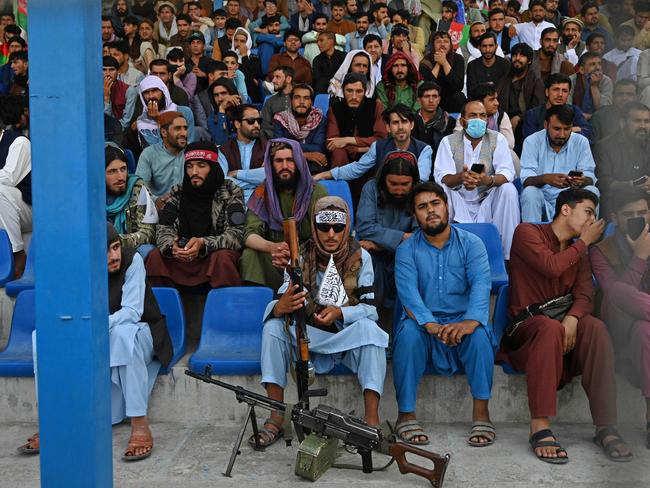
Peter Jennings, an executive director of the Australian Strategic Policy Institute and a former deputy secretary for strategy in the Department of Defence, argued in Wednesday’s The Australian that the Test would be a PR exercise for the Taliban.
“It is inconceivable that we could endanger the lives of Australian personnel to save Afghans from Taliban persecution in August, only to then host a Taliban-endorsed Test cricket team in November,” Jennings wrote.
“Cricket was banned in Afghanistan when the Taliban was in power two decades ago. Since then, the sport has grown in popularity in the country, and it seems a more pragmatic Taliban plans to use cricket to bolster its rule domestically and present a more moderate image overseas.”
Australian Test captain Tim Paine took a similar approach to Cricket Australia’s chief executive when asked about the future of the Test match.
“The United Nations and that sort of stuff will have a fair bit to say with any country dealing with Afghanistan and the Taliban or whoever is running control for that country – we will have to wait and see,” he said.
“I’d like to think the decision around that Test match or dealings around a certain country would be made at United Nations level, not at a cricket level.
“You leave that side to that level of discussion and they make those kinds of decisions and then cricket and a Test match is a long way second thought after that.
“But we will be guided by international politics.”
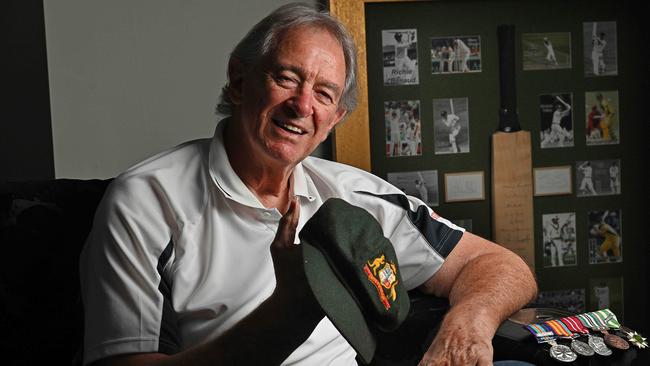
Test digger’s flag warning for historic Hobart clash
The last living Australian cricketer to have served in armed combat believes Australia should play Afghanistan in the Hobart Test — but not fly the Taliban flag.
Tony Dell, the lanky English-born Queensland fast bowler who played two Tests in the 1970s, has just released a biography detailing his post-traumatic stress disorder that went undiagnosed for four decades after he returned from the Vietnam War as a 22-year-old in 1968.
The release of Dell’s brutally honest work And Bring the Darkness Home (Pitoh Publishing: Greg Milam) has coincided with a complex public debate over whether Australia should play Afghanistan in a proposed Test in November given the recent Taliban takeover of that nation.
“For the sake of the cricket and the cricketers, of course they should play — but I would not be flying the Taliban flag (at the Test in Hobart),” Dell said.
“I would play it because the Test is not a competition between the governments. It is not the Taliban versus the LNP. It is Australia versus Afghanistan. It could do a lot of good for both nations.”
Many have compared the Vietnam and Afghan wars and Dell sees the link.
“There are many similarities,” he said. “Bad wars. Bad results. Defeats. People ask were they really worth it? But the majority of all veterans will disagree with that.
“The book is as much about the consequences of war as it is about my cricket. I came home from Vietnam in 1968 quite physically fit but I was damaged mentally but I did not know it for 40 years.
“We think we are fine and it is the rest of the world which is out of step. I had a few highs and many, many lows before I was diagnosed with PTSD in 2008.
“The 1990s were my darkest time – I lost everything I had — but coaching my son’s cricket teams got me through those years.’’
Dell is proud of the fact his diagnosis prompted him to start the Stand Tall for PTS foundation which helps veterans deal with the lingering traumas of war.
“It has changed many lives but there is much more work to be done,’’ said Dell, who has reconnected with his own children after being estranged from them.
As a consequences of his stresses, Dell, while he has overcome the nightmares and flashbacks, still has aversion to crowds and sat down while talking at his book launch, explaining that while his head is now in a sound place his legs still turn to jelly while he talks.
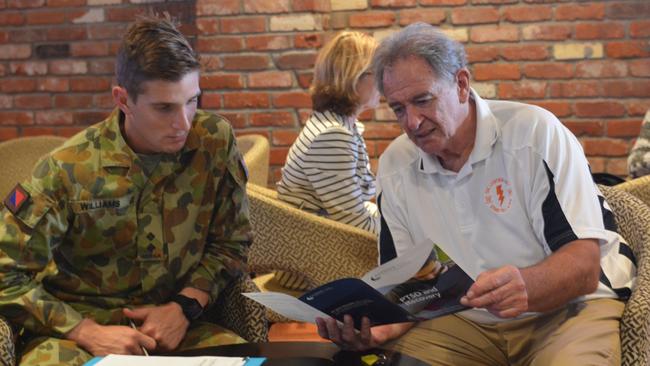
Dell, who took five wickets in his Test debut against England at the SCG in the 1970-71 Ashes, won rich praise at the launch from Ian and Greg Chappell who agreed he was a vastly underrated bowler.
Greg said one of the greatest compliments Dell received as a bowler was the South African batting great Barry Richards, during his stunningly successful visit to South Australia as an import, electing to change his footwork to cope with Dell’s awkward bounce.
TALIBAN FLAG FEAR FOR AUSSIE TEST
—Robert Craddock and Peter Lalor
An internationally renowned Tasmanian cricket statistician is concerned about the prospect of the Taliban flag flying above Hobart’s Blundstone Arena this summer.
The stunning takeover of Afghanistan by the Taliban following American evacuation has left cricket in a state of confusion and cast a cloud of uncertainty over Afghanistan’s proposed first Test against Australia in Hobart in November.
The traditional tricoloured Afghanistan flag has been taken down from government buildings in Kabul and been replaced by the mainly white Taliban flag bearing the regime’s formal name: Islamic Emirate of Afghanistan.
Ric Finlay, the Tasmanian statistician whose Tastats service is used around the globe, is a great admirer of the Afghanistan team but feels “uneasy’’ about the “optics’’ of the Test, including the new Taliban sanctioned flag flying at Blundstone Arena.
“That (the Taliban flag flying) would be an anathema to me,’’ Finlay said. “The symbolism of what it would mean is immense. I don’t think (the new flag) will fly. I don’t think the authorities would let it. That decision may be made by high up government sources.
“I am uneasy with it. Hopefully this Test won’t be used to validate what happened in Kabul.
“But there is a lot of water to go under the bridge yet. I certainly welcome the Afghanistan team because they are not what the Taliban represents.
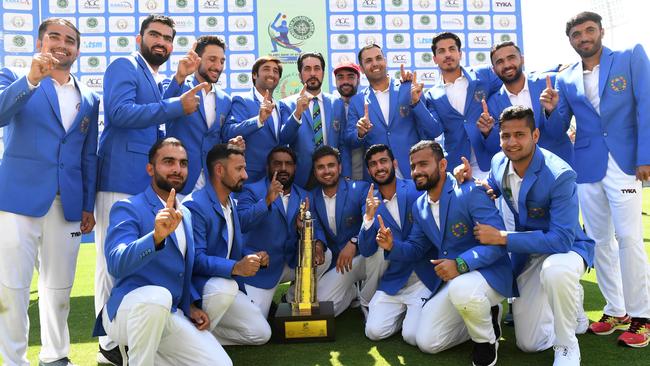
“They started in exile, embraced the game and have done really well and I will love watching them play if they come … but it is the symbolism around this game. Who are they actually representing?
“The issue of what is happening with the Afghanistan women’s team is also the elephant in the room.’’
When they were last in power two decades ago, the Taliban banned or restricted women from studying or playing sport – and while Taliban officials have given permission for their men’s team to play Australia in November, the future of their women’s side remains clouded.
Afghan women’s cricketer Roya Samin, who fled Afghanistan days before the Taliban took over Kabul, told The Guardian she feared for many of her teammates who were left behind.
“The Taliban are against girls studying, so how do they want a girl’s cricket team?” Samin said. “My other teammates who stay in Afghanistan are afraid, they stay in their houses. They are sad, they ask people to please help us. Emotionally and physically, they are not good.
“We all emailed the ICC but got no response from them. Why do they not respond to us, why do they not consider us, even treat us that we don’t exist in the world?’’
Taliban rule casts shadow over historic Test in Hobart
Cricket Australia was given the first indication on Monday its little publicised Test against Afghanistan in Hobart has suddenly grown sharp thorns.
Usman Khawaja was peppered with a couple of questions at a press conference in Brisbane about how he would feel playing Afghanistan in November if the touring nation‘s new ruling Taliban banned women from playing the sport.
“Those sorts of questions are out of my pay league,” Khawaja said.
“I will leave the politics to the politicians.’’
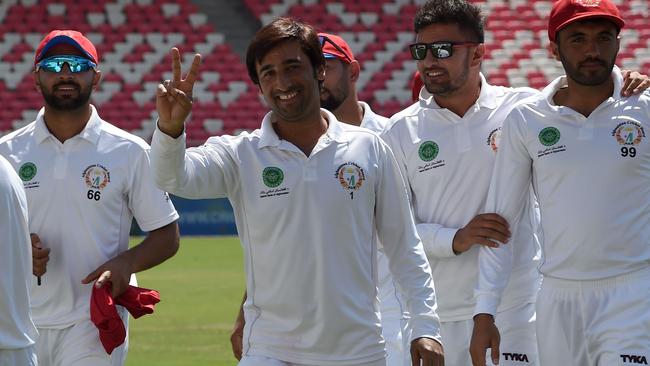
Khawaja could be forgiven for shouldering arms but this issue will get bigger before it gets smaller and eventually Cricket Australia may have to ask itself the same question that was asked of Khawaja.
While Taliban spokesmen have endorsed the prospect of the men’s team going to Hobart, promising to enforce a less strict version of Islamic law this time, the Afghanistan women‘s program is seen as being under severe threat following last month’s takeover of the country.
Should the women’s program fold, it could threaten cricket powerbrokers support of the men’s team given Test playing nations are required to have male and female teams.
Australia has never played Afghanistan in a Test and the last meeting between the two nations was in the 2019 World Cup. The rise of Afghanistan, with many players learning their craft in refugee camps, has been one of cricket‘s most enchanting stories of the 21st century.
Politics aside, Khawaja said he would relish the chance to play them.
“I think it is great if Australia plays Afghanistan. They are a country which has not played a lot of cricket at international level. They have got some amazing players. Obviously everyone knows Rashid Khan, Mohammad Nabi and Mujeeb (Ur Rahman).”
Khawaja, 34, has not played a Test since the 2019 Ashes tour but averaged 60 playing Sheffield Shield last summer to remain a chance of being recalled this season.
TALIBAN GREEN LIGHT HISTORIC TEST IN HOBART
—Peter Lalor
The Taliban has indicated approval for the Afghanistan male cricket team to travel to Australia for a historic Test match in November, but the move highlights bigger issues for cricket in the wake of the brutal regime’s coup.
There are grave concerns for the 25 contracted female cricketers trapped in the country.
Female soccer players were advised to burn any photographs, trophies or memorabilia and sporting organisations around the world are attempting to help female athletes many of whom have received death threats as the Taliban took over.
SBS confirmed with a member of the Taliban that there is no specific objection to the men’s side travelling to Australia for the game due to start on November 27 in Hobart.
The deputy head of the Taliban’s cultural commission Ahmadullah Wasiq told SBS Pashto that all previously organised matches “will continue without interruption, and (the Afghan team) can play with other international teams”.
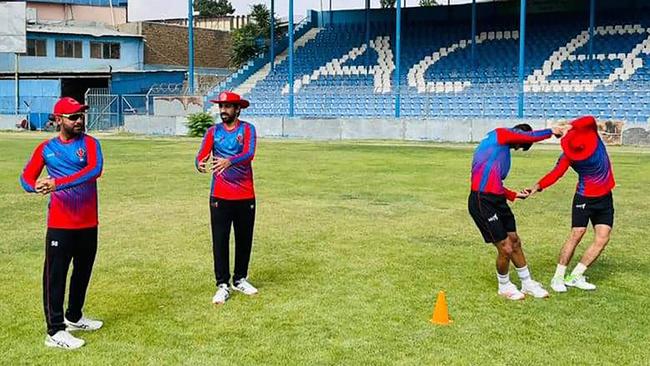
“In the future, we want good relations with all countries,” he said. “When good relations are established, Afghan players can go (to Australia) and they can come here.”
Australia was due to play Afghanistan in December 2020 but cancelled because of the pandemic. Cricket Australia is continuing with plans to host the men’s side for the first Test of the summer.
“Cricket Australia’s planning for the historic first Test match between Australia and Afghanistan in Hobart is well underway,” a spokesperson said.
“There is goodwill between CA and the Afghanistan Cricket Board to make the match happen, which immediately follows the ICC T20 World Cup in the UAE in which the Afghanistan team is due to play.
“CA will continue to work with the Australian and Tasmanian governments ahead of the Afghanistan team’s arrival planned for later this year.”
A Taliban government using cricket for a form of soft diplomacy while banning women is a looming issue for Australian and international cricket.
In 1971-72 then board chair Don Bradman called off the South African side’s tour of Australia as protest against that country’s apartheid regime.
Bradman did, however, invite members of the South African team to play in a World XI series which was convened as replacement.
To engage in bilateral series with a country whose government denies women a place in sport or society should trigger similar debates and calls for a similar stance to that taken with South Africa’s apartheid regime.
According to SBS, the Taliban representative, Wasiq, attended a player draft event for a domestic Twenty20 competition on August 26 to reassure the cricket community they could play without fear.
“Our ultimate goal was to reassure all our players, the cricket board officials and colleagues that they can continue their games without any fear or intimidation, and call on their colleagues to come and play with confidence, and to also get prepared for domestic and upcoming international games,” Wasiq said.
“(The players and cricket board officials) were very happy and assured that they would do their best. Islam attaches great importance on health, and it is important that everyone should be healthy.”
The Taliban politician said it was important that cricketers wear clothing in accordance with Islamic law. The Afghanistan Cricket Board attempted to resuscitate women’s cricket in that country when it contracted 25 players in November 2020.
ICC regulations require full members to have a national women’s team, but chief executive of the ACB Hamid Shinwari believes the Taliban will not allow the women to play.

“I think it will be stopped, that is my assumption,” he told the BBC. “I really don’t know what will be the position in the future.
“We have kept the salaries and they are on our payroll. If the government decides that we don’t go with the national women’s team, we will have to stop.”
Afghanistan has already abandoned a three-match ODI series against Pakistan because of logistic difficulties in the wake of the evacuation by America and its allies.
The 17-man squad had gathered in Kabul in mid-August but the board made the decision not to travel to the UAE for the series and rejected Pakistan’s offer to host it there.
Brisbane Heat announced on Thursday it had signed Afghanistan spinner Mujeeb Ur Rahman for his fourth BBL series.
The Taliban banned women from receiving an education or leaving the house unaccompanied by a male relative during its last period in government.
Originally published as Australia v Afghanistan Test: Former coach Peter Anderson fears women will be blamed for match being cancelled


